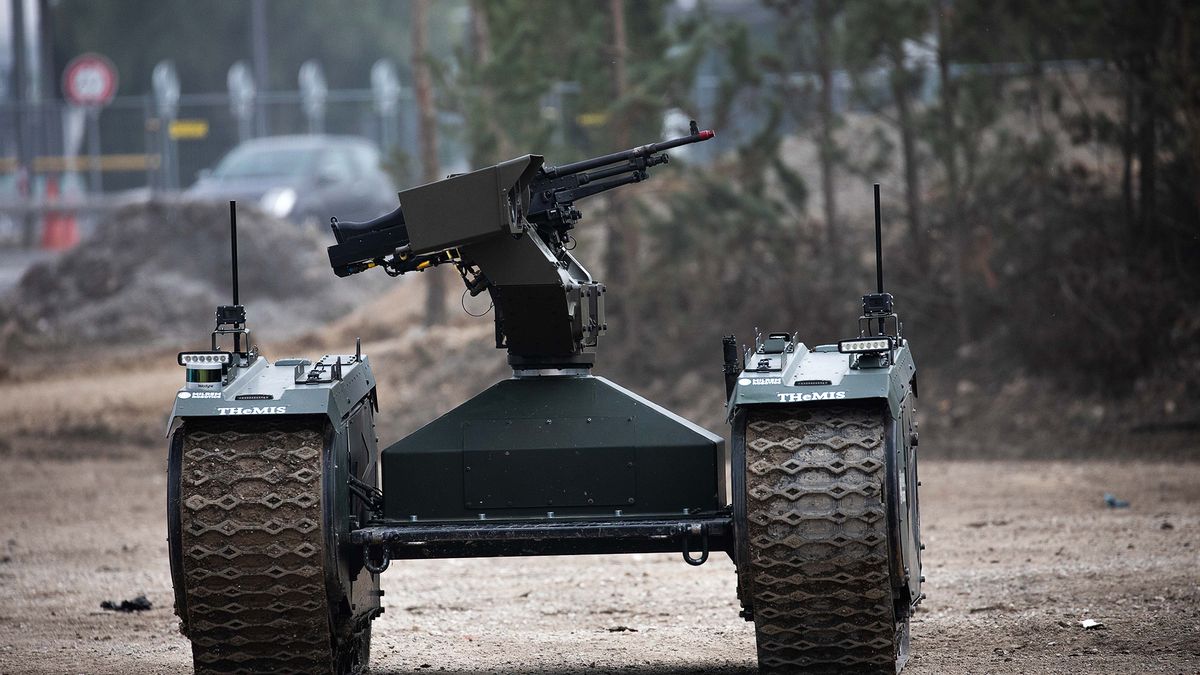Lethal Autonomous Weapons Systems (LAWS) are capable of independently selecting and engaging targets without any direct human intervention. At times, these systems are labeled as lethal robots or robotic weapons. Drones, which are frequently referred to as unmanned systems, fail to suit this classification precisely due to the fact that humans control them via remote operators. On the contrary, autonomous weaponry is frequently categorised as “out-of-the-loop” systems due to the fact that it functions without ongoing human supervision. After being programmed, these weapons execute their missions autonomously, eliminating the need for human intervention and effectively eliminating the operator’s role in decision-making. Instead of autonomous weapons, drones operate using an “in-the-loop” system. Self-governing weapons, conversely, possess the ability to make decisions.
With respect to this matter, LAWS can be classified into two distinct categories based on their aptitude for making decisions: semi-autonomous weapons (SAWs) and autonomous weapons (AWs). SAWs are dependent on human operators for operation. Nevertheless, AWs are entirely functional without human assistance.
Do LAWs Exist?
Governments are progressively manufacturing and deploying armaments that operate autonomously. On the other hand, specific systems that have existed for decades have integrated basic autonomous functions.
Defensive systems are the most prevalent form of weapon capability-equipped weapon. Such systems consist of antivehicle and antipersonnel mines, which function autonomously upon activation via trigger mechanisms.
Missile defence systems and sentinel systems, which are more recent and utilise more advanced technology, can autonomously detect and engage targets and issue warnings. Additional illustrations can be found in loitering munition, which is also referred to as suicide, kamikaze, or explosive drones. These weapons are equipped with an internal warhead and loiter around a predetermined area until an operator on the ground or automated sensors onboard detect a target. At this point, they launch an attack. Since their inception in the 1980s, these systems have undergone significant advancements in functionality, enabling longer ranges, heftier payloads, and the potential integration of artificial intelligence (AI) technologies, among other improvements.
Additionally, autonomous land and sea vehicles are becoming increasingly sophisticated. Although their primary purpose is reconnaissance and information gathering, these systems might also be equipped with offensive capabilities in the near future.
Concerns
The most commonly mentioned security concerns pertain to the potential for these weapons to quicken the rate of conflict and increase the probability of resorting to war. This is largely due to the assurance of substantially diminished military casualties. They fuel and incite arms competitions. Terrorist organisations and renegade governments are among the non-state armed entities that are capable of obtaining and employing these laws. They defy established regulations, restrictions, and laws governing warfare.
Unlike nuclear weapons, LAWS does not require specific, difficult-to-obtain materials and will be challenging to trace and monitor. There is a projection that autonomous weapons will ultimately supplant Kalashnikovs due to their accessibility. Peter Singer argues that war will remain artificial in nature in the foreseeable future due to its current robotic characteristics.
Two incidents highlight present-day conflicts that involve the application of robotics-based mechanical technology. A private contractor provided initial assistance to the opposition armed forces during the Libyan Civil War in the form of commercial, non-military drones. Second, while fighting the Islamic State (IS), Russia, Iraq, the United States, Iran, Turkey, and Syria have all employed semi-autonomous weapons such as drones. Consequently, the advancement of LAWS would inexorably lead to enhancements in asymmetric warfare because of the evident advantages for the user.
The primary objection to maintaining LAWS is that an algorithm or machine learning system could never acquire the ability to comprehend ethical and legal principles. The second concern pertains to the inappropriateness of excluding humans from the system, as that would render accountability impossible. In essence, a machine cannot comprehend the intrinsic value of human life and, as a result, cannot be completely relied upon. Another concern is that fewer combatants succumbing in battle would lead to new conflicts or wars. The United States’ extensive use of drone operations in Afghanistan and Pakistan serves as an illustration.
A special report published by the United Nations (UN) in April 2013 argued that member states ought to proactively prohibit and abstain from developing or utilising these weapons, as they contravene the ‘Principle of Distinction’ (jus in bello) and ‘Principle of Proportionality’ (jus ad bellum).
Many ethical issues emanate from data as it is a main driver of recent advancements in AI. It can produce ethical and humanitarian problems as it can be incomplete, low-quality, and incorrect or false.
Pakistan and LAWs
“The weaponization of cyberspace and Artificial Intelligence are posing challenges from political, legal, and ethical standpoints” -Said Ambassador Muhammad Syrus Sajjad Qazi, Foreign Secretary of Pakistan.
Political, legal, normative, and ethical challenges are posed by the weaponization of cyberspace and Artificial Intelligence (AI), particularly the deployment and use of lethal Autonomous Weapon systems (LAWS) and the increasing digitization of warfare. Foreign Secretary of Pakistan, Ambassador Muhammad Syrus Sajjad Qazi said that the issue at hand necessitates our collective attention and concerted efforts to establish norms, regulations, and safeguards.
According to Pakistan’s position, the AI-Cyber nexus and the advancement of offensive cyber capabilities augmented by artificial intelligence have increased the potential for inadvertent military escalation; as a result, careful consideration is required.
Pakistan recognises the dual nature of these technologies and the threats that unregulated military applications pose to regional and international security, according to the Foreign Secretary. Pakistan, in its capacity as a conscientious participant in the global community, is resolute in its dedication to confronting these challenges. Pakistan underscores the critical nature of international collaboration to establish a legally enforceable structure that regulates the ethical applications of artificial intelligence and cyberspace. Furthermore, Pakistan espouses the principles of a rule-based global system that upholds accountability and transparency and safeguards vital civilian infrastructure.
Pakistan is proactively participating in multilateral forums to foster dialogue and cooperation on a regional and global scale, aiming to mitigate the risks and cyber threats associated with military applications of artificial intelligence and address this matter. Pakistan also favours implementing an all-encompassing strategy that engages all stakeholders—including academia, the private sector, governments, and civil society—to devise plans for a stable, open, and safe cyberspace that benefits all individuals.
Pakistan firmly advocates universal, just, and impartial access to emergent and novel technologies. Furthermore, it vehemently denounces any excessive limitations imposed on the accessibility of these nascent technologies. Pakistan argues that the implementation of security-oriented restrictions may hinder the progress of developing countries in the fields of technology and science. As a result, an additional stratum of discrimination would be erected between developed and developing nations. Therefore, Pakistan firmly believes that developing countries have an inherent and indispensable right to unrestricted access, vital for promoting technological advancements and scientific progress globally.
The technological advancements profoundly influence all aspects of life, particularly shaping our understanding of security. It underscores the importance of comprehending the challenges presented by these new frontiers in technology. This acknowledgment by Pakistan likely calls for a proactive and informed response to navigate the evolving landscape created by these technological changes.

Table of Contents
ToggleAbdul Wassay
Abdul Wassay is a Research Assistant at the Centre for Aerospace and Security Studies, Lahore. He can be reached at info@casslhr.com.














One Response
At least, Pakistan is working on some right things.